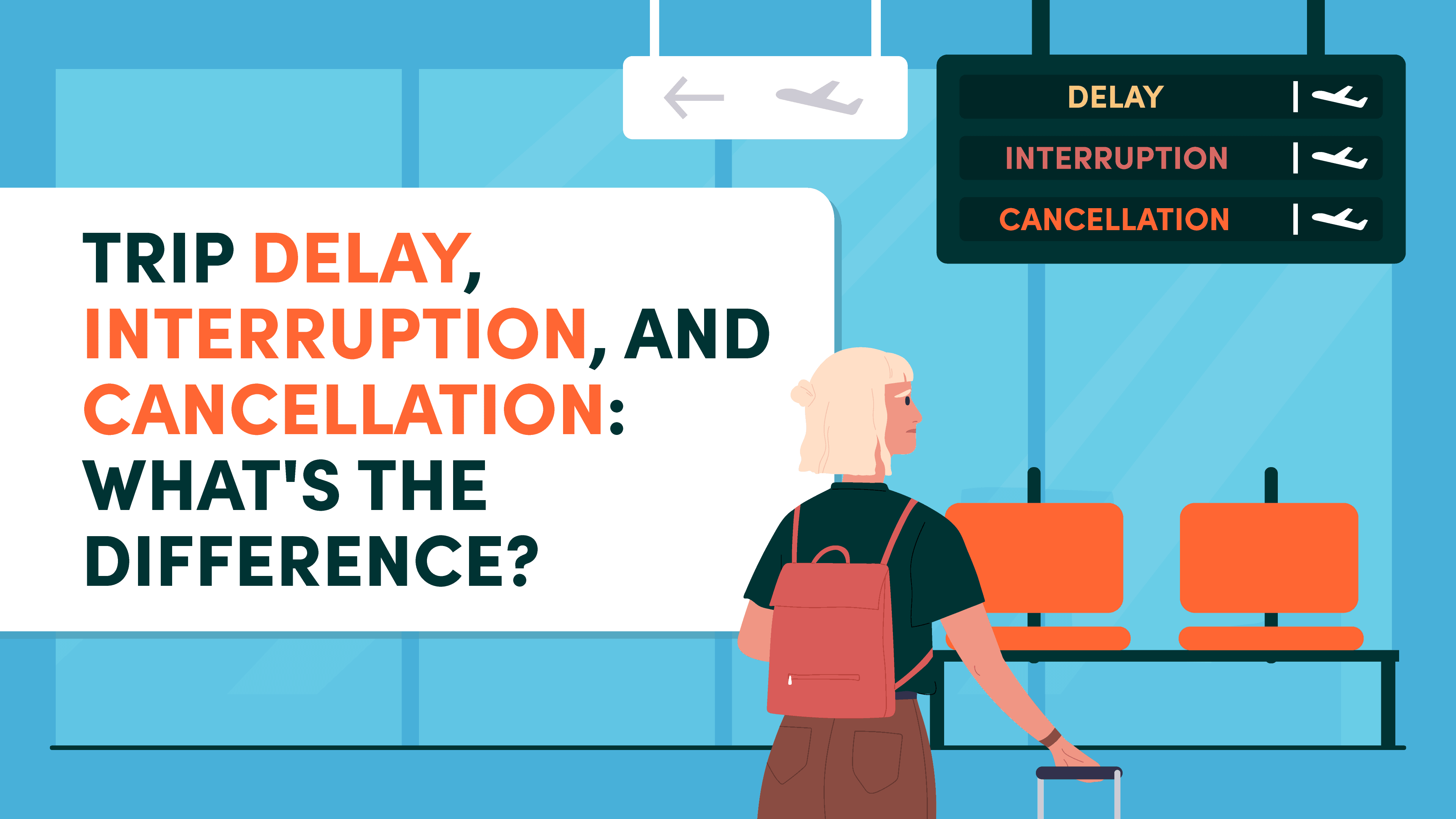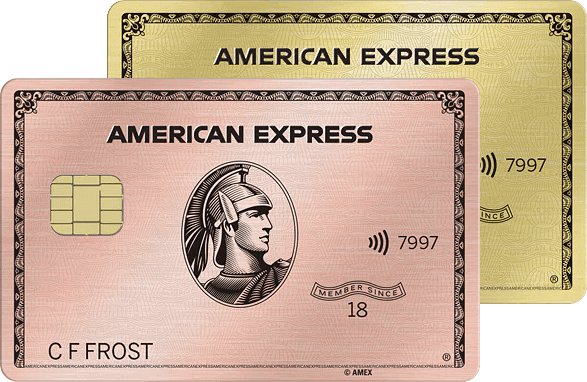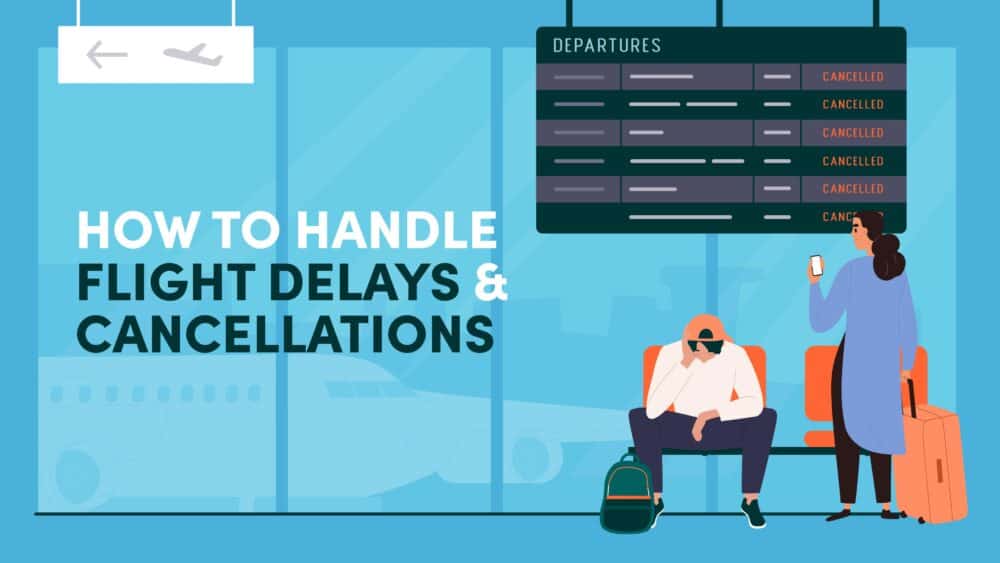
10xTravel is part of an affiliate sales network and receives compensation for sending traffic to partner sites, such as CreditCards.com. This compensation may impact how and where links appear on this site. This site does not include all financial companies or all available financial offers. Terms apply to American Express benefits and offers. Enrollment may be required for select American Express benefits and offers. Visit americanexpress.com to learn more.
Note: Some of the offers mentioned below may have changed or may no longer be available. The content on this page is accurate as of the posting date; however, some of our partner offers may have expired. You can view current offers here.
You may have spent a lot of time planning your dream vacation, having carefully dotted your i’s and crossed your t’s. But just when you think nothing can go wrong, you begin to realize that your trip is not going to proceed according to what you have planned.
It’s not unusual for unforeseen circumstances to cause trip delays or even emergency cancellations. This is why travel insurance is so important in preparing for these glitches and hitches that may occur. With a solid insurance plan, you can protect your travel investments and minimize the possibility of you incurring losses. Luckily, sometimes these coverages are included at no extra cost if you book with certain credit cards with insurance.
When it comes to travel insurance, it is necessary to know the differences between trip delay, cancellation, and interruption. This will give you a full understanding of exactly when each of these benefits needs to be used, and will help you choose the best insurance policy for you.
Trip Delay
Trip delay coverage reimburses a traveler for covered expenditures up to the maximum amount when the traveler is delayed for a minimum number of hours while on a covered trip. This is helpful when travelers are forced to postpone their departure or return due to conditions beyond their control, such as bad weather and aircraft maintenance problems.
Trip delay benefits are centered around paying back travelers for the financial losses they incur due to unavoidable delays. Let’s say a flight from New York to London was delayed due to bad weather conditions. The travel delay coverage would provide a refund for expenses like transport, meals, and hotel lodgings to insured travelers. This can be especially helpful in situations like weather delays, where airlines often won’t provide any accommodations.
Travel delay coverage typically offers between $100 and $1,000 as reimbursements for unexpected expenditures. This means that an insured traveler will first have to pay the bills and later on file a claim along with relevant documents before receiving a refund. Some credit cards offer coverage when your flight is delayed by at least six or 12 hours, depending on your card.
Keep in mind that trip delay often doesn’t kick in for flights departing from your home airport, as you can likely just stay at home. Be sure to read the terms of your policy to understand when trip delay insurance will kick in.
This coverage may also include a daily limit and a maximum limit. A daily limit is a per-day allowance the travel insurance will refund a traveler, while the maximum limit is a combination of all daily limits to which a traveler lays claim. Therefore, anything that exceeds these limits is the traveler’s responsibility.

Trip Cancellation
Trip cancellation is a pre-departure travel insurance benefit that provides reimbursements for prepaid and non-refundable trip payments when a traveler has to cancel their trip before departure. Circumstances like injuries, illness, and death are the most commonly covered reasons for trip cancellation.
With trip cancellation insurance, a traveler can be reimbursed up to 100% of the trip’s total cost, including flights, hotel reservations, and other bookings, as long as the entire amount was insured and the reason for the cancellation is valid.
For example, a traveler books a three-week vacation to the Bahamas at a non-refundable cost of $6,000. This includes flights, hotel lodgings, and outings. Then a week before the departure, the traveler falls violently ill. If the travel insurance qualifies the illness as a covered reason and the total cost of the trip was insured, the traveler should be refunded the entire prepaid and non-refundable cost.
The cost of obtaining trip cancellation coverage depends on the travel insurance policy, the age of the traveler, the destination, the length of the trip, and how much the trip costs. Some credit cards include trip cancellation coverage if you book your expenses with that card. Although all policies offer complete coverage of the trip cost, some plans come with more benefits, such as medical evacuation for a little more money.

Trip Interruption
Trip interruption is a post-departure travel insurance benefit that provides reimbursement for the unused portion of prepaid and non-refundable trip payments. This occurs when a traveler has started the trip but is forced to cut it short and return home as a result of some unexpected circumstance like illness, injury, natural disaster, or death.
This travel insurance benefit is especially valuable when expensive trips have been booked. When a vacation is interrupted early, Trip Interruption covers up to 100% of the prepaid and non-refundable trip expenditures that have been missed. Some insurance plans will reimburse the traveler up to 150% to 200% of the total trip cost to cover the extra expenses for the traveler’s return flight.
Although there are travel insurance policies that provide Trip Cancellation also incorporate Trip Interruption at no additional cost, they are not the same benefit. Trip Interruption provides reimbursement of your trip costs if a traveler needs to interrupt the trip after departure, while Trip Cancellation happens before departure. Most credit cards that have Trip Cancellation Coverage will also have Trip Interruption Coverage.
An example of Trip Interruption would be when a traveler begins a two-week vacation in Italy, and within the first few days, a forest fire breaks out, causing the traveler to return home. Since the trip had already begun but was interrupted due to the natural disaster, the traveler may be reimbursed for the unused portion of the trip as long as it was insured.

How Do Trip Delays, Cancellations, and Interruptions Work With Credit Cards?
It is always a clever strategy to have your travel insurance sorted out before your trips. Even though unforeseen circumstances are bound to happen during trips, people sometimes choose to forego travel insurance. Probably because they don’t want to pay the premiums or they don’t know they have coverage through a credit card.
Fortunately, there is a better alternative than having to purchase third-party travel insurance. This alternative is the credit card. Travel insurance is often offered by credit cards, especially travel rewards credit cards at no additional cost. Coverage provided usually includes trip delay, trip cancellation, trip interruption, and lost and damaged baggage coverage. Some credit cards even offer medical evacuation and limited medical coverage.
To get these coverages, a traveler must pay for some or all of the trip through their credit card or with their credit card reward points. Immediate families, such as spouses and dependent children, are usually covered by credit card travel insurance, and in some cases, extended family members and people who you have paid to travel along with you may also benefit from the insurance.

What to Know About Credit Card Travel Insurance
Before making any trip bookings and payments, it is important to take a look at your card’s guide to know what is covered and who is qualified for travel insurance. Credit cards come with different plans, but here are some questions to help you find out if your credit card will provide enough coverage.
- Who is covered? This is important, especially if people will be traveling along with you. Make sure your travel insurance also covers them.
- What are the coverage limits? Travel insurances are not unlimited, including that which your credit card provides. Therefore, you must be aware of what your coverage limits are.
- What expenses are covered? Some policies may only provide coverage for canceled expenses such as prepaid airplane, train, or cruise tickets. Be sure to know what expenses are covered.
- What unforeseen circumstances are covered? There is usually a list of reasons that policies qualify for coverage, such as natural disasters, terrorism, and death. You can check what events are covered by your credit card travel insurance.
- What are the exclusions? Accidents from activities considered dangerous such as skydiving or personal situations like childbirth are often excluded from travel insurance coverage. It is important to know what situations your insurance will not cover.
Bottom Line
When planning a trip, there are unforeseen circumstances that should be taken into consideration and prepared for. Failure to prepare for these situations can cause travelers to incur huge financial losses. Trip insurances provide travelers with policies that help protect their travel investments in the eventuality of trip delays, cancellations, and interruptions.
Credit cards are a way through which travelers can get travel insurance, and unlike third-party insurance, they are free for the most part. Although getting trip insurance from credit cards can be a great approach to preventing loss, it is important to find out all the necessary details and rules in your card’s insurance policies to help make the best insurance plan for your trip.
New to the world of points and miles? The Chase Sapphire Preferred® Card is the best card to start with.
With a bonus of 60,000 bonus points after you spend $4,000 on purchases in the first 3 months of account opening. , 5x points on travel booked through the Chase Travel Portal and 3x points on restaurants, streaming services, and online groceries (excluding Target, Walmart, and wholesale clubs), this card truly cannot be beat for getting started!
Editors Note: Opinions expressed here are author’s alone, not those of any bank, credit card issuer, hotel, airline, or other entity. This content has not been reviewed, approved or otherwise endorsed by any of the entities included within the post.








